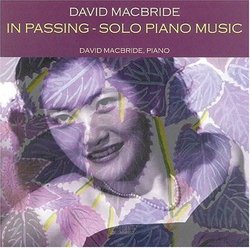| All Artists: David MacBride Title: David Macbride: In Passing - Solo Piano Music Members Wishing: 0 Total Copies: 0 Label: Albany Records Release Date: 9/28/2004 Genre: Classical Styles: Chamber Music, Historical Periods, Classical (c.1770-1830) Number of Discs: 1 SwapaCD Credits: 1 UPC: 034061067726 |
Search - David MacBride :: David Macbride: In Passing - Solo Piano Music
 | David MacBride David Macbride: In Passing - Solo Piano Music Genre: Classical
On this CD are gathered shorter and occasional pieces and one extended work by California-born composer David Macbride. The pieces were written in a period spanning a little over a decade, and are played by him here with a... more » |
Larger Image |
CD Details
Synopsis
Album Description
On this CD are gathered shorter and occasional pieces and one extended work by California-born composer David Macbride. The pieces were written in a period spanning a little over a decade, and are played by him here with a nuanced artistry and great authority. It is a delightful and ultimately very moving recording, as it reveals a composer in mid-career who is able to do that very hardest of things, which is to allow the listener into his world without posing or imposing. In a period when "new music" often seems to need some kind of verbal explanation, Macbride's work, even at its most complex, holds true to music's purpose, which is to communicate directly to the listener with sounds. So natural and sure is his composer's art that any accompanying notes seem almost unnecessary. Nevertheless, it is a pleasure to recommend music that is at once so touching and so beautifully made. Macbride's roots in California and in Beijing, China, the birthplace of his mother! , influence the tone of his music, which, even at its most dense, generates an extraordinary attentiveness and calmness in the hearer. His language seems an effortless coalescence of Eastern and Western elements, remnants of neo-classicism, figurations and harmonies from mid-century jazz, and, at times, echoes of Satie, Messiaen and of an attractive early work of fellow Californian John Cage. Different degree of influence from these sides emerge in different works, but one is struck in the end by the music's remarkably unified voice and sense of purpose. Transparent, lucid, firmly in the present, yet also deeply meditative, the overriding impulse behind Macbride's expression feels quietly, unpretentiously religious.

 Track Listings (6) - Disc #1
Track Listings (6) - Disc #1